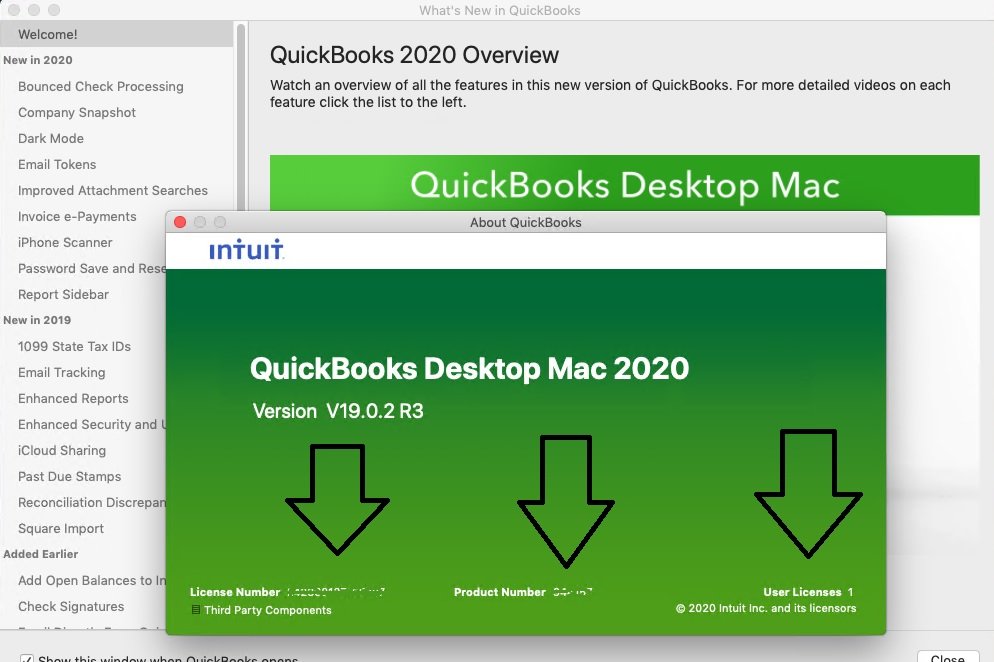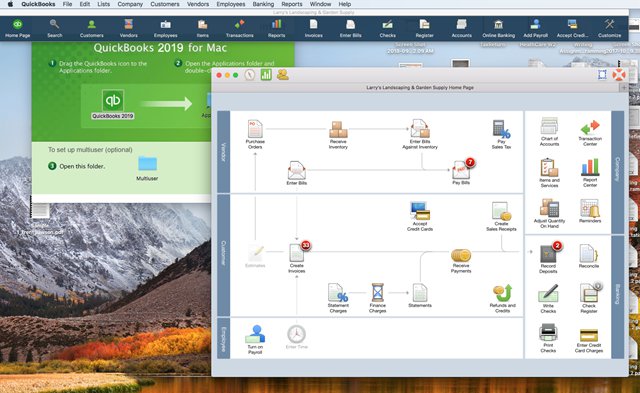| Developer(s) | Intuit Inc.[1] |
|---|---|
| Initial release | 1983; 38 years ago |
| Stable release | |
| Operating system | Microsoft Windows[1] macOS (USA only) |
| Type | Accounting software |
| License | Proprietary |
| Website | quickbooks.intuit.com |
QuickBooks is an accounting software package developed and marketed by Intuit. QuickBooks products are geared mainly toward small and medium-sized businesses and offer on-premises accounting applications as well as cloud-based versions that accept business payments, manage and pay bills, and payroll functions.
History[edit]
Intuit was founded in 1983 by Scott Cook and Tom Proulx in Mountain View, California, USA. After the success of Quicken for individual financial management, the company developed similar services for small business owners.

Initial release[edit]
Quicken for Mac imports data from Quicken for Windows 2010 or newer, Quicken for Mac 2015 or newer, Quicken for Mac 2007, Quicken Essentials for Mac, Banktivity. 30-day money back guarantee: If you’re not satisfied, return this product to Quicken within 30 days of purchase with your dated receipt for a full refund of the purchase price less. SOLVED. by QuickBooks. QuickBooks Desktop Payroll. 39. Updated 1 month ago Learn how to keep your software up-to-date so you always have the latest features and fixes. You can update QuickBooks Desktop automatically or manually.
The initial Quicken software did not function as a 'double-entry' accounting package. The initial release of QuickBooks was the DOS version that was based on the Quicken codebase. The Windows and Mac versions shared a different codebase that was based on In-House Accountant, which Intuit had acquired. The software was popular among small business owners who had no formal accounting training. As such, the software soon claimed up to 85 percent of the small business accounting software market. It continues to command the vast majority of this market.[2] Professional accountants, however, were not satisfied with early versions of the system, citing poor security controls, such as no audit trail, as well as non-conformity with traditional accounting standards.
Subsequent releases[edit]
Intuit sought to bridge the gap with these accounting professionals, eventually providing full audit trail capabilities, double-entry accounting functions and increased functions. By 2000, Intuit had developed Basic and Pro versions of the software and, in 2003, started offering industry-specific versions, with workflow processes and reports designed for each of these business types along with terminology associated with the trades.
Options now include versions for manufacturers, wholesalers, professional service firms, contractors, non-profit entities[3] and retailers, in addition to one specifically designed for professional accounting firms who service multiple small business clients. In May 2002 Intuit launched QuickBooks Enterprise Solutions for medium-sized businesses.
In September 2005, QuickBooks had 74% of the market in the US.[4] A June 19, 2008 Intuit Press Release said that as of March 2008, QuickBooks' share of retail units in the business accounting category reached 94.2 percent, according to NPD Group. It also says that more than 50,000 accountants, CPAs and independent business consultants are members of the QuickBooks ProAdvisor program.[5] By then Brad Smith was the new CEO, though former CEO Steve Bennett had nearly tripled Intuit revenue and quadrupled earnings in eight years.[6]
On September 22, 2014, Intuit announced the release of QuickBooks 2015 with features that users have been requesting from the past versions. The release includes improved income tracker, pinned notes, improved registration process and insights on homepage.[7]
In September 2015, Intuit released QuickBooks 2016 that contains several improvements to the existing ones and new features such as batch transaction, bill tracking, continuous feed label printer support, batch delete/void transactions etc.[8]
In September 2016, Intuit released QuickBooks 2017 with several improvements like automated reports, smart search and improved viewing of report filters among other things.[9]
In 2017, Intuit released QuickBooks 2018 to give its users a better experience by adding features such as mobile inventory barcode scanning, multi-monitor support, search in the chart of accounts, mobile inventory scanning etc. [10]
On September 17, 2018, Intuit announced the release of QuickBooks 2019 with some unique features requested by its users, including history tracker for customer invoices, ability to transfer credits between other jobs of the same customer, payroll adjustment feature, and more. [11]
On September 16, 2019, QuickBooks 2020 was launched with the aim to improve the reliability and experience of using the software. All the desktop versions - Pro, Premier, Accountant, and Enterprise are packed with new features like the ability to add customer PO number in email subject lines, send batch invoices to customers, automatic payment reminders, collapse and expand columns, easy QuickBooks version update etc.[12]
International versions[edit]
Versions of this product are available in many different markets. Intuit's Canadian, British and Australian divisions offer versions of QuickBooks that support the unique tax calculation needs of each region, such as Canada's GST, HST or PST sales tax, VAT for the United Kingdom edition and Australia's GST[13] sales tax. The QuickBooks UK edition also includes support for Irish and South African VAT. QuickBooks Enterprise was withdrawn from the UKI market in 2014.
QuickBooks Desktop is only available on a rental / subscription basis for users in UK and Ireland.
The Mac (macOS) version is available only in the United States.
Features[edit]
Intuit has integrated several web-based features into QuickBooks, including remote access capabilities, remote payroll assistance and outsourcing, electronic payment functions, online banking and reconciliation, mapping features through integration with Google Maps, marketing options through Google, and improved e-mail functionality through Microsoft Outlook and Outlook Express. For the 2008 version, the company has also added import from Excelspreadsheets, additional employee time tracking options, pre-authorization of electronic funds and new Help functions. In June 2007, Intuit announced that QuickBooks Enterprise Solutions would run on Linux servers, whereas previously it required a Windows server to run.[14]
QuickBooks Online[edit]
Intuit also offers a cloud service called QuickBooks Online (QBO). The user pays a monthly subscription fee rather than an upfront fee and accesses the software exclusively through a secure logon via a Web browser. Intuit provides patches, and regularly upgrades the software automatically, but also includes pop-up ads within the application for additional paid services.
As of May 2014, QuickBooks Online had the most subscribers for an online accounting platform, with 624,000 subscribers.[15] compared to Xero, which reported 284,000 customers as of July 2014.[16]
The cloud version is a distinct product from the desktop version of QuickBooks, and has many features that work differently than they do in desktop versions.[17]
In 2013, Intuit announced that it had rebuilt QuickBooks Online 'from the ground up' with a platform that allows third parties to create small business applications and gives customers the ability to customize the online version of QuickBooks.[18]
QuickBooks Online is supported on Chrome, Firefox, Internet Explorer 10, Safari 6.1, and also accessible via Chrome on Android and Safari on iOS 7.[19][20] One may also access QuickBooks Online via an iPhone, a BlackBerry, and an Android web app.[21][22]
In 2011, Intuit introduced a UK-specific version of QuickBooks Online to address the specific VAT and European tax system. There are also versions customized for the Canadian, Indian, and Australian markets, as well as a global version that can be customized by the user.[23]
Quickbooks Online offers integration with other third-party software and financial services, such as banks, payroll companies, and expense management software.[citation needed]
QuickBooks Point of Sale[edit]
QuickBooks Point of Sale is software that replaces a retailer's cash register, tracks its inventory, sales, and customer information, and provides reports for managing its business and serving its customers.
Add-on programs[edit]
Through the Solutions Marketplace, Intuit encouraged third-party software developers to create programs that fill niche areas for specific industries and integrate with QuickBooks. Intuit partnered with Lighter Capital to create a $15 million fund for developers designing apps for Intuit Quickbooks.[24] The Intuit Developer Network provides marketing and technical resources, including software development kits (SDKs).
Intuit's Lacerte and ProConnect Tax Online tax preparation software for professional accountants who prepare tax returns for a living integrates with QuickBooks in this way. Microsoft Office also integrates with QuickBooks.
Criticism[edit]
As of November 2014, users of QuickBooks for OSX have reported compatibility issues with Apple's new operating system, OS X Yosemite.[25]
See also[edit]
References[edit]
- ^ abElsa Wenzel. 'QuickBooks 2008 Pro Specs'. CNET. Retrieved May 17, 2008.
- ^'USA TODAY Education - Careers TODAY'. USA Today. Retrieved October 31, 2013.
- ^'Nonprofit accounting software from QuickBooks'. Quickbooks.intuit.com. December 3, 2012. Retrieved October 31, 2013.
- ^'How To Face Off Against Microsoft'. Businessweek. September 4, 2005. Retrieved October 31, 2013.
- ^'Intuit Hits 50,000-member Milestone With QuickBooks ProAdvisor Program'. Intuit.com (Press release). June 19, 2008. Retrieved October 31, 2013.
- ^'Intuit Announces CEO Succession - Brad Smith'. Intuit.com (Press release). August 22, 2007. Retrieved October 31, 2013.
- ^Bonnie Biafore. QuickBooks 2015: The Missing Manual: The Official Intuit Guide to QuickBooks. O'Reilly. ISBN978-1491947135.
- ^'Intuit Releases QuickBooks Accountant Desktop 2016'. Accounting Today.
- ^'QuickBooks 2017 Has Arrived! Here Is What to Expect - Accountex Report'. Accountex Report. September 6, 2016. Retrieved January 19, 2018.
- ^'New and Improved Features in QuickBooks Desktop 2018'. Firm Of The Future.
- ^'Intuit Debuts QuickBooks Desktop 2019'. Accounting Today.
- ^'QuickBooks Desktop 2020: What's New'. Ace Cloud Hosting.
- ^Finis, Lauretta. 'Setting up GST in QuickBooks Online'. Intuit QuickBooks Australia. Retrieved September 3, 2016.
- ^'Intuit Press Release - Intuit's QuickBooks Enterprise Solutions Embraces Linux'. Intuit.com. June 13, 2007. Retrieved October 31, 2013.
- ^http://investors.intuit.com/press-releases/press-release-details/2014/Intuit-Reports-Third-quarter-Results-Revenue-Grows-14-Percent-Led-by-Cloud-Solutions/default.aspx
- ^https://www.xero.com/media/3261697/ceos-presentation-2014-annual-meeting.pdf
- ^'Accounting Software for Small Business - Intuit QuickBooks'. Oe.quickbooks.com. Retrieved October 31, 2013.
- ^'Intuit Launches the Completely New QuickBooks Online'. Intuit. September 23, 2013.
- ^'QuickBooks Online — Smarter Tools. Better Business'. quickbooks.intuit.com. Retrieved April 5, 2018.
- ^http://help.quickbooks.intuit.com/kb/WKlFnQ/supported-browsers
- ^'QuickBooks Comes To iPhone, BlackBerry - Personal Tech - Smart Phones'. Informationweek.com. August 26, 2008. Retrieved October 31, 2013.
- ^'Calling all Android users! | QuickBooks Online Blog'. Blog.quickbooksonline.com. February 5, 2010. Retrieved October 31, 2013.
- ^Howlett, Den. 'Intuit Q3 FY2016 provides important insights about SMBs and the cloud'. Diginomica. Retrieved September 3, 2016.
- ^'Lighter Capital Announces New $15 Million Fund to Help Developers Grow Apps Designed for Intuit QuickBooks Platform'. Intuit. Retrieved January 24, 2019.
- ^''Intuit community' Is an update to QuickBooks Mac 2014 Planned for Yosemite compatibility?'.
External links[edit]
- Official website
Note: Graphic adapted from Intuit source documents.
qb_mac_2019_(4x4)
Yes, Mac lovers, that is what I said. Intuit has re-released ‘QuickBooks for Mac’ for 2019 with enhancements to boot.
Even though the last updates to QuickBooks for Mac were back in 2016, and we didn’t even see a ‘2017 or 2018 version’ of the Mac product, you now have a new and improved version for 2019.
This isn’t a ‘fool you with a box’ and only give you the Mac App for QuickBooks Online… this is the real thing to run locally on your Mac computer under the Apple-Mac-OS.
Speaking of the OS, the requirements for this version are at least Mac OS X v10.12 (Sierra), but also supported are Mac OS X v10.13 (High Sierra), and Mac OS X v10.14 (Mojave). You will need a Mac with an Intel Core 2 Duo (or higher) Processor, a minimum of 2GB of RAM available to the application (4GB is recommended), at least 250 MB of available disk space for the application, and a CD/DVD drive or Internet connection for installation. You must use a 100% Macintosh-compatible printer if you plan to print invoices, check, deposit slips, lists, purchase orders, mailing labels, reports or graphs. You will need Intuit (QuickBooks-for-Mac-formatted) checks if you plan to print checks.

As you can see in the image below, when the QuickBooksMac2019.dmg file is downloaded it opens to allow you to simply copy the QuickBooks for Mac program into you Mac 'Applications' folder. It takes only moments to then activate the software, register your license and be set and ready to go with the QuickBooks for Mac you always loved, plus more.
×Note: Graphic created using an early-release version of QuickBooks for Mac 2019.

Now not being a QuickBooks for Mac (regular) user and not having anything but a 'sample file' provided with QuickBooks for Mac to play around with, there wasn't really any data supporting the new features... but I did my best to capture some meaningful images that will show you the variety of new and/or enhanced features in this 2019 version including:
- Bank/Credit-card Reconcile Discrepancy Report which identifies changes made to reconciled transactions since the last reconciliation. But note, this will only impact transactions created in this version, it won’t track transactions entered into older versions of the software. (Might be a reason to think about starting a new file when you transition to this newest version of QuickBooks for Mac.)
Note: Graphic produced from an early-release copy of QuickBooks for Mac 2019.
- Email Tracking from the new Email tab in both the Customer and Vendor Centers allows you to track the dates when emails (including emailed transactions) are sent to either your vendors or customers.
Note: Graphic produced from an early-release version of QuickBooks for Mac 2019.
As you can see, this new tab gives you the ability to not only see who (your customers) you send the emails to, but also any CC and Bcc recipients. It also provides details of the Date, Subject, type of transmittal (Invoice, Sales Receipt, etc.), the number of each item along with the amount and the QuickBooks User who sent the Email.

Similar information is available within the Vendor Email tab, as shown below.
×Note: Graphic produced using an early-release version of QuickBooks for Mac 2019.
- iCloud Document Sharing provides a way for sharing your QuickBooks for Mac file using the iCloud sync feature. You can work on your file while at home, sync via iCloud, and then continue working on your Mac computer at work.
Note: Graphic adapted from an Intuit QuickBooks for Mac 2019 source document .
Please note that this feature is not intended for multiple users to be working on the same file by syncing copies simultaneously while other users are still in the file.
For more details about ‘file-sharing’ using iCloud, consult the official Apple website regarding iCloud Drive and file-sharing functionality.
- Passwords will now be required if your file contains any sensitive information. All such information including social security, tax identification, bank account, and other identifying information is now encrypted by QuickBooks. Complex passwords with a 90-day reset requirement will be required for access to such files for each user account. (Note: I was required to create a complex password (even in this sample file) the moment I started to open it initially.)
Note: Graphic created from an early-release version of QuickBooks for Mac 2019.
- Report Windows have been re-sized for improved readability and enhanced spacing. I could be mistaken, but in spending a short time with this feature, it seems closer to the way that sizing works in ‘QuickBooks for Windows’ versions than in prior ‘QuickBooks for Mac’ versions. I wonder if QuickBooks for Mac users will really like that?
Note: Graphic created from an early-release version of QuickBooks for Mac 2019.
[By the way, I do realize that this isn't the entire Balance Sheet (or even the entire first page)... but you get the idea.]
- Square Import feature allows users to incorporate their sales data from Square by means of a .csv file import. Since I don't have a Square account I didn't have a way to test this feature, but it seems pretty straight forward. When you click on the little 'Square' icon at the top of an import transaction window (like the one for Sales Receipts as shown below), you are presented with a dialog box from which to select the .csv file for import. Pretty straight forward stuff.

Note: Graphic created from an early-release version of QuickBooks for Mac 2019.
To me this seems like the 'good old Mac' product that most QuickBooks for Mac users liked so well. It offers these, and perhaps a few more enhancements and improvements we were not made aware of. Without spending a lot more time with the product it would be hard for me to say what else users of the Mac version may find to their liking.
Undoubtedly, the thing the Mac users will find most appealing is that what they thought was an 'abandoned product' back in 2016, with notice that it would not be supported as of 2019, is now 'back' with a new version.
So, from all of us here at Insightful Accountant, 'welcome back, Mac!'
Quickbooks 2017 Pro
Notes & Disclosures:
2017 Quickbooks Pro Free Trial
Graphics or other illustrations used in this article have either been prepared using an early-release version of QuickBooks for Mac 2019 software, or were furnished and/or adapted from Intuit source content. Be aware that certain aspects of features described or illustrated herein may have changed between the pre-release software version we used and the release of QuickBooks for Mac 2019 desktop products scheduled for September 11, 2018.
This article is intended to serve as a summary of QuickBooks for Mac 2019 product feature reported to us by Intuit as being new to the software. This article is not an in-depth review of QuickBooks for Mac 2019, nor has it been written to provide instruction in the proper use of the software, or any of the specific 'new' features within the software.
Quickbooks 2017 Free Download
While the writer or editor may express a personal opinion within this article regarding this feature and/or the software as a whole, such personal opinion does not constitute a formal endorsement by Insightful Accountant or the publisher regardless of any phrasing used by the author.
